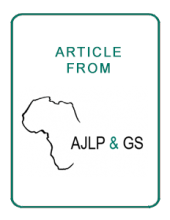Land Library
Welcome to the Land Portal Library. Explore our vast collection of open-access resources (over 74,000) including reports, journal articles, research papers, peer-reviewed publications, legal documents, videos and much more.
/ library resources
Showing items 1 through 9 of 45.L’acquisition de larges superficies de terres arables dans les pays en développement pour y effectuer des investissements a pris forme et ampleur au Sénégal en 2000 avec l’avènement des réformes dans le secteur agricole.
The Horn of Africa has seen its fair share of natural resource conflicts among and between competing pastoralists communities. The conflicts hitherto associated with men, ignored women pastoralists’ role in the same conflict.
L’accès des femmes au foncier est au cœur de l’actualité depuis trois décennies. Dans le Sud de la Mauritanie, la mainmise des hommes sur les terres est une réalité. Les femmes ne représentent que 4.2% des détenteurs des Titres fonciers.
Innovative technologies for land governance can promote clear land tenure and effective land administration, reduce corruption, and support economic growth. Mobile technologies offer real-time access to information and open communication between people and government services.
The purpose of this study is to explore the challenges of women on land rights, in Tanzania customary practices often required woman to access land through their fathers, brothers, husbands or other men who control the land, so this makes women vulnerable and decreases agricultural productiv
Land is owned by the state and peoples of Ethiopia. Rural farmers and pastoralists have landholding right which contains bundle of rights. Women have equal right to fully use their landholding. Ethiopia has implemented a first level land certification (FLLC).
In Zambia, security of tenure for communities residing under customary land tenure settings has in recent years increasingly come under threat owing to the pressures of high rate of urbanization, speculation, subdivision and conversion to state land, which effectively excludes marginal population
Effective reform pathways for addressing women’s access to land and tenure security in Africa are yet to be found despite their role in feeding the population.
Rural women’s livelihoods in Africa are dependent on their rights and entitlement to land as well as security of tenure. Equally important is how land laws and land governance systems shape and reshape women’s access to land and tenure security.

